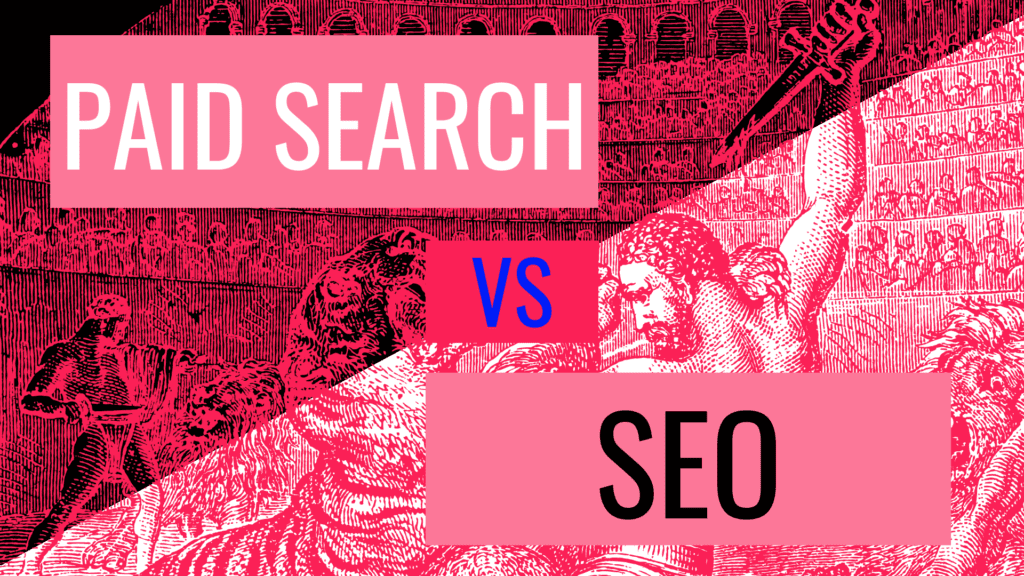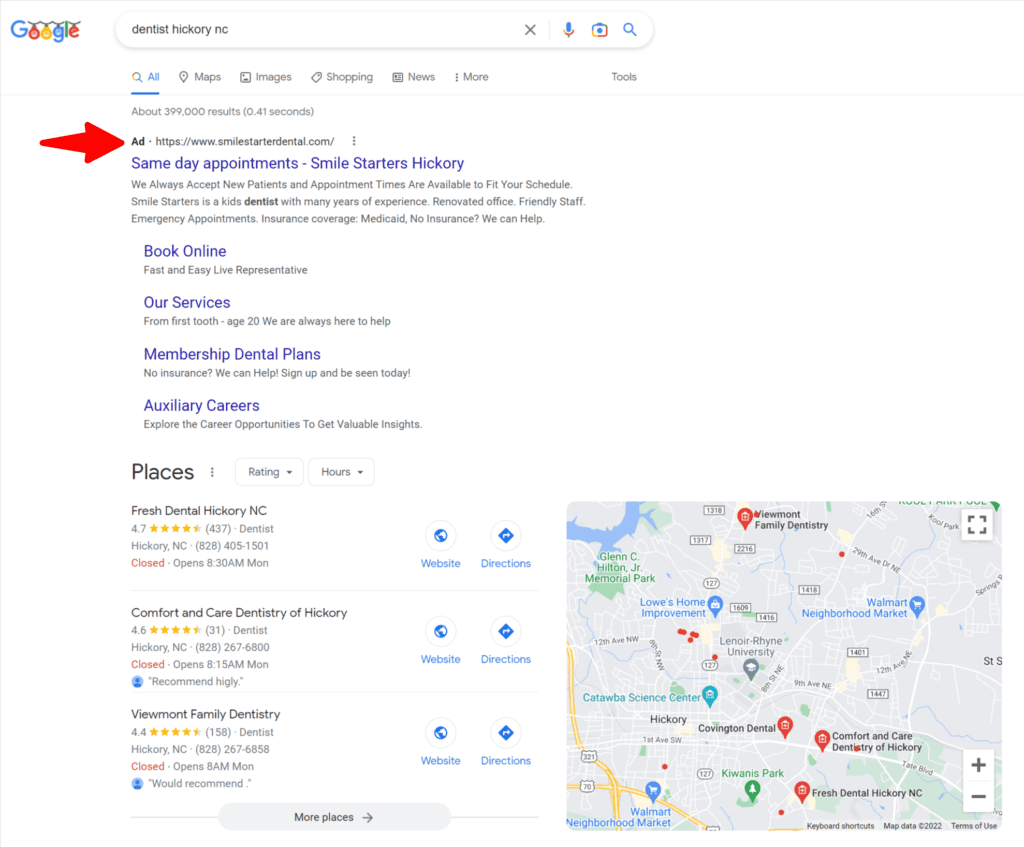Does Paid Search or SEO work best for Dentists who are trying to generate leads in Hickory, NC?

Generating leads for dentists on search engines like Google or Bing isn’t overly challenging in most cities, given the significant search volume in the industry. According to Google’s Keyword Planner, the keyword “dentist near me” alone receives between 100 and 1,000 searches per month in Hickory. A 5% click-through-rate (CTR) could potentially yield your practice between 5 and 50 clicks for that search term, translating to 5-50 new prospects for your business. However, the question remains: for dentists in Hickory, what’s the optimal focus for their marketing budget? Should they prioritize paid search (advertising on search engine result pages) or search engine optimization (aiming to rank organically for search terms)?
It’s advisable to conduct some research before reaching a unanimous decision. For instance, when you search “dentist Hickory NC” on Google, what results do you observe?
- An ad at the top.
- Places (Google My Business listings).
- Organic listings (results that aren’t paid for).
- More ads.
How far do you typically scroll before clicking on something? For many people, that would be no further than the map listings (just #2 on the list above).

There are some important conclusions we can start to make from doing this simple search.
1. Ads dominate The Top
Google typically prioritizes displaying ads above Google My Business and organic listings for dental searches. This preference is largely due to ads being Google’s primary source of income. Given that ads occupy the top positions, they enjoy the highest visibility, which is crucial in marketing. Without visibility, regardless of whether it’s a paid or organic listing, users are unlikely to click through to your website. Since SEO efforts don’t influence the placement of ads, paid search emerges as the victor in securing the top spot.
2. There is a Lot of Competition
The dental industry is highly saturated and consequently very competitive. This is evident in the multiple ads, numerous Maps listings, and a plethora of organic listings typically displayed in search results. However, paid search holds an advantage in this scenario too, as it’s generally easier to improve your position in the ads listings compared to enhancing your position in organic listings through SEO efforts.
3. Places Can’t Be Ignored
The section labeled “Places” consists of Google My Business listings, also referred to as map listings. This area holds significant importance on the search engine results pages (SERPs), as many users, myself included, often bypass the ads and focus on the businesses with the highest ratings in this section. Currently, the top three listings I observe have a minimum of 150 reviews and a rating of 4.5 stars. While ads can appear in this section, Google does not guarantee their presence, and there is no specific campaign designed to place ads here. Therefore, the advantage lies with SEO.
4. Organic is buried
Organic listings, which is SEO focused, is buried between ads at the top and ads at the bottom. However, there are many people who will still scroll down far enough to see them, and as mentioned earlier, visibility is very important. Ads do not show between organic listings, so the advantage of this section goes to SEO.
Beyond what we can conclude from doing a simple search are some other important factors to consider.
5. Time
It’s pretty widely known that it will take a lot longer to generate leads through organic listings than it will by running ads. For example, if a dentist approached Puhzition and wanted to get ads up and running by EOD today, we could do that. But, if a dentist wanted to show up organically on Google by EOD today, I’d say “you’re out of your mind.” SEO takes TIME, and lots of it. Advantage – paid search.
6. Price
When it comes to price, an important metric to look at is return-on-investment (ROI). Most marketing goals focus on this metric, because most local based businesses can’t throw a bunch of money into branding campaigns just to drum up consideration. They need a positive return, and they need it fast.
For paid search your going to run into fees for building campaigns, for campaign management, and for ad-spend. For search engine optimization your going to run into fees for onsite and offsite optimization. Sometimes this can be project based, but usually it will be a monthly cost for the unforeseeable future.
I mentioned ROI as an important metric that most marketing goals are focused on… but because most local businesses have a difficult time figuring out what all of their costs are, many marketers focus on return-on-ad-spend (ROAS), which is much easier to calculate (for paid search only). If for example, you spend $4000 on ad-spend, and you generate 84 leads at a value of $67,000 you would have a 16.75x ROAS – i.e. for every dollar you spent you generated $16.75 dollars of revenue.
Conclusion
Paid search is pretty easy to gauge the effectiveness of, and you can gauge it relatively quickly. SEO, which as mentioned above takes TIME, will take longer to gauge, because it may take several months before you start to rank for keywords like “dentist near me”, that will start bringing visitors to your site. This gives paid search the initial advantage, but overtime it may even out, or SEO could become more profitable. With that said, I would suggest focusing the majority of efforts on paid search, but dedicate some budget to SEO as well. Both are important and both can bring lots of new business through your door.
